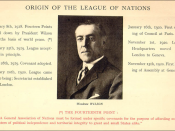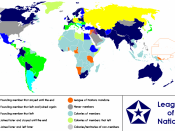Some may argue that the League of Nations was a success while other would say it was a total failure, but, failure or not, the concept was far ahead of its time. But nonetheless, the organisation had various flaws that contributed to its downfall. The League was created simply because Woodrow Wilson demanded it, in 1919 after the end of World War I. It was to promote international peace and righteousness. Wilson wanted countries to talk out their problems instead of resorting to violence and war. It was made of forty-two countries and by the 1930s, the number rose to sixty. There were various flaws in the League, but it still achieved many things in its short life. The League of Nations had four main functions: to stop war from ever happening again, disarmament, to make the world a better place by improving people's lives, and to enforce the Treaty of Versailles.
The League did not stop war from ever happening again; it is possible that it helped cause World War II, but the League did successfully settle two cases that could have resulted in war. In Corfu, the League managed to get Italy to leave Greece. In 1925, they also settled disagreements between Greece and Bulgaria. They also persuaded Yugoslavia to leave Albania and stop the dispute over the Aaland Islands. In attempting to settle these disputes, the League forced the Greeks to pay Italy money and apologize even though Mussolini was the one who invaded Greece. Again, in Bulgaria, the League condemned the Greeks and forced them to leave. It appeared as if the League sided mostly with rich and powerful countries. The League could not afford to displease any wealthy countries. It was as if there was one law for the powerful and one for the weak.


